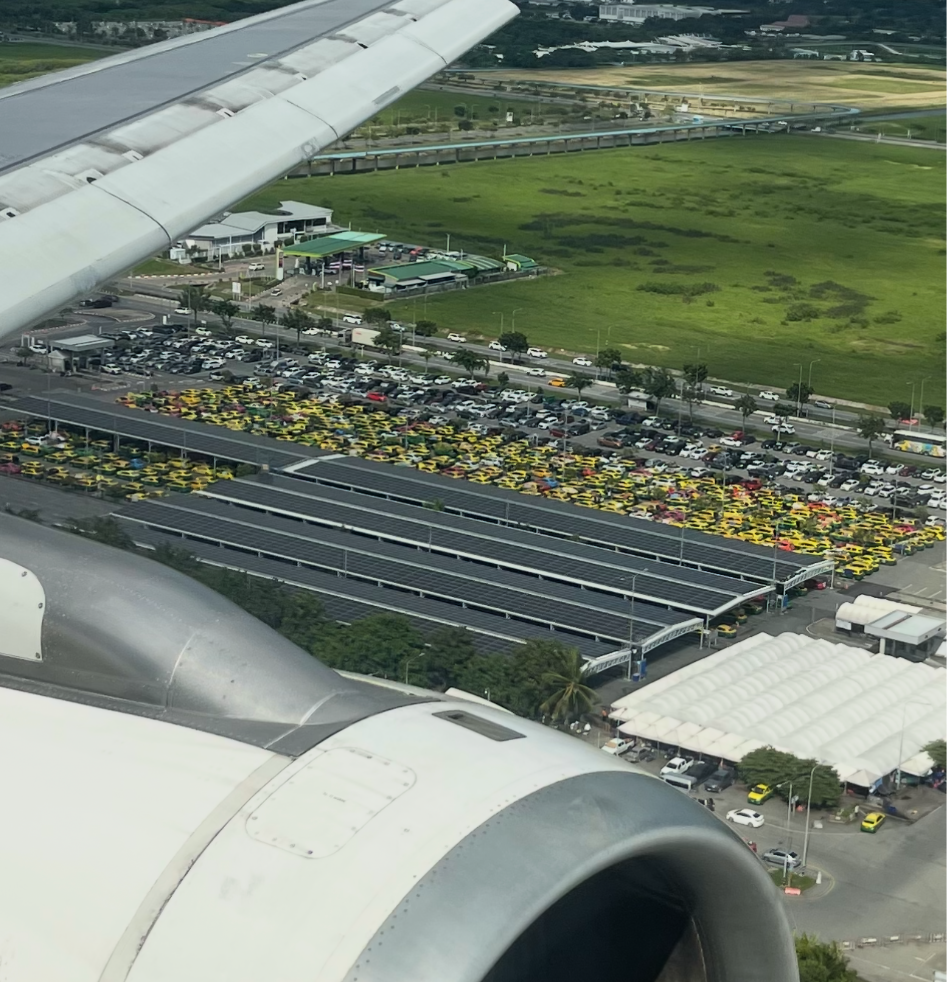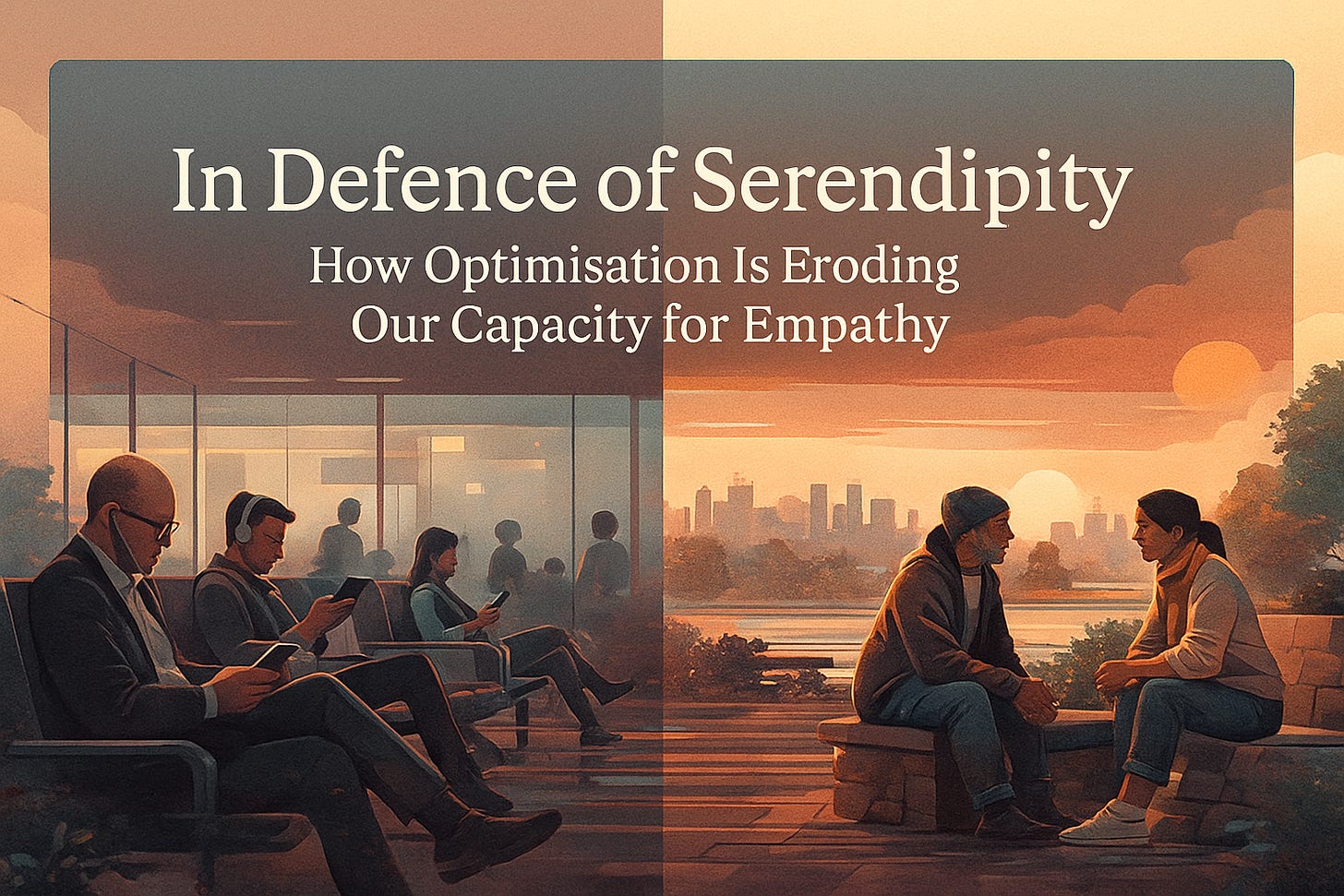In Defence of Serendipity
How Optimisation Is Eroding Our Capacity for Empathy
In the past week I’ve had four serendipitous moments.
In Lisbon I returned my rental car and was waiting for a friend to pick me up. It was chilly — properly cold for someone warm-blooded from an Asia home — and after only a few minutes I felt genuinely miserable. What must it be like to be homeless in weather like that, I wondered, as my butt started getting even colder on the stone I was sitting on. I waited only twenty minutes, but the discomfort set in almost immediately.
Just this morning, driving to the airport in Bangkok, I passed the long, snaking queues of taxis in the remote parking area. A procession several kilometres long. Today the early “winter” brought a comfortable 23°C, but I’ve flown over these same drivers as I landed on scorching 40°C days, sweating in their cars, just waiting for a fare. Many build makeshift tents over their cars to keep them, and themselves, cooler. (And we all wonder why they don’t want to use the miserably cheap meter once they get passengers.)

Another morning, I sat outside and watched the world go by. Dozens of people zipped past on e-scooter rentals — each person cocooned in their own soundtrack, earbuds firmly in, gliding through the city with minimal friction and minimal interaction.
A few days ago, in the Schiphol airport lounge in Amsterdam, I looked around: almost everyone was absorbed in a device — phone, tablet, laptop — watching videos, answering emails, scrolling endlessly. It seemed no one was meeting anyone new. They weren’t even making eye contact. And the room? Easily 90% men. (Next time you turn left on a plane and see a sea of bald heads, ask yourself: why is that? And then acknowledge the privilege you have, too. Also, shout out to my dear friend Jane who years ago shared this insight with me.)
Lately I’ve been intentionally keeping my earbuds in my bag and my phone in my pocket. I’d have missed these life vignettes if I hadn’t. These four small stories, all from the same week, made me think:
Are we losing the serendipity of life in our pursuit of technological efficiency, convenience and personalised curation?
Why Serendipity Matters
Serendipity is the experience of unplanned, fortunate moments — chance encounters, unexpected conversations, sudden observations that remind us how other people live. These moments build our empathy muscles.
When we have to wait outside for a ride, or sit with taxi drivers, or share space with strangers in an airport, we collect signals from worlds that might look nothing like our own. We imagine what others might be going through. Our brains collect information that helps us imagine others’ stresses or losses; and equally their hopes, joys, happinesses and dreams.
But technology — especially AI-enabled tech — increasingly optimises away these moments which the algorithms find pointless. To them, these aren’t strictly instrumental objectives and so should be avoided. Every possible inconvenience is being engineered out of our lives.
Wait time? —> Eliminated.
Randomness? —> Minimised.
Asking strangers for directions? —> Unnecessary.
Encounters? —> Avoided.
And with that, so weakens the serendipity that helps us stay connected with each other.
The Unequal Loss of Empathy
What worries me most is that this erosion isn’t evenly felt.
Those with the most access to optimisation tools — the apps, the shortcuts, the automations — are also the ones losing the most serendipity. And with it, perhaps, the most empathy.
Meanwhile, people without these tools still live in a world of waiting, friction, and unpredictable human interaction.
The divide often maps onto the Global North and South — but just as sharply within societies, too, where the wealthy optimise, and the working class endures.
The result?
A widening empathy gap between the tech-haves and the tech-have-nots.
And when the tech-haves are also recognised as the policymakers, innovators, thinkers, and shapers, we risk a dangerous dynamic emerging:
Their lived experience becomes increasingly detached from the people they are designing for or making decisions about. Not out of malice — but simply because technology has smoothed out all the rough edges that used to bring them into contact with difference. You don’t know what you don’t know.
I know that this isn’t something we consciously choose. Rather, it’s more like a slow boil — subtle and cumulative. It may just be that the erosion of serendipity in our lives may be as harmful as any of the big, well-publicised risks of AI. We just aren’t talking about it; and I think we should.
The Stakes
Truth is, we are increasingly curating our own personal worlds — not just in the media we consume but in where our bodies physically spend time. Technology increasingly nudges us away from the inconvenient and random and unknown, instead edging us closer to a logical objective, getting from A to B faster and more optimised.
Truth is, we are increasingly curating our own personal worlds — not just in the media we consume but in where our bodies physically spend time.
If we aren’t careful, we’ll over-index on the tech and risk losing the very experiences that make as human, and help us cultivate empathy. Or find love.
That matters a lot, because without empathy:
We can’t design better policies that ensure human flourishing for everyone.
We can’t build technologies that address the real needs of those most marginalised or invisible to us — or enable them to create the lives they want.
We can’t recognise when our own conveniences create someone else’s hardship.
Serendipity is not inefficiency. ( wrote about this in these pages here — check it out.)




